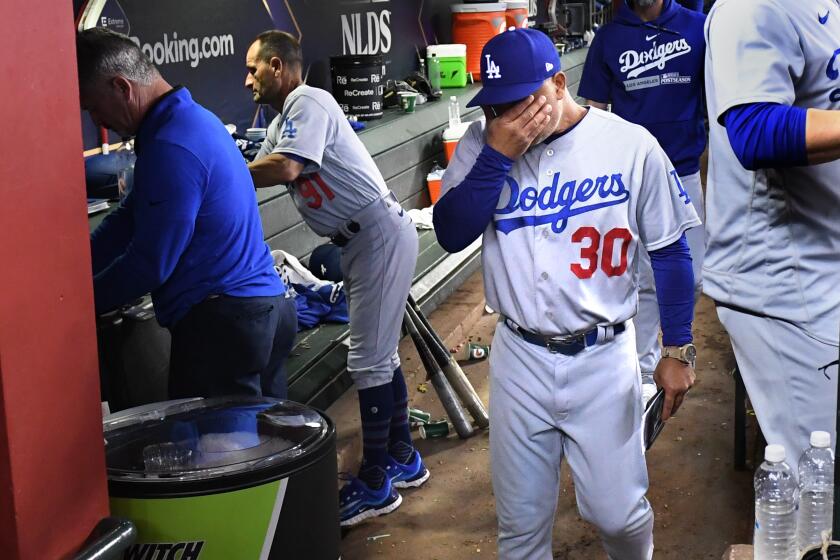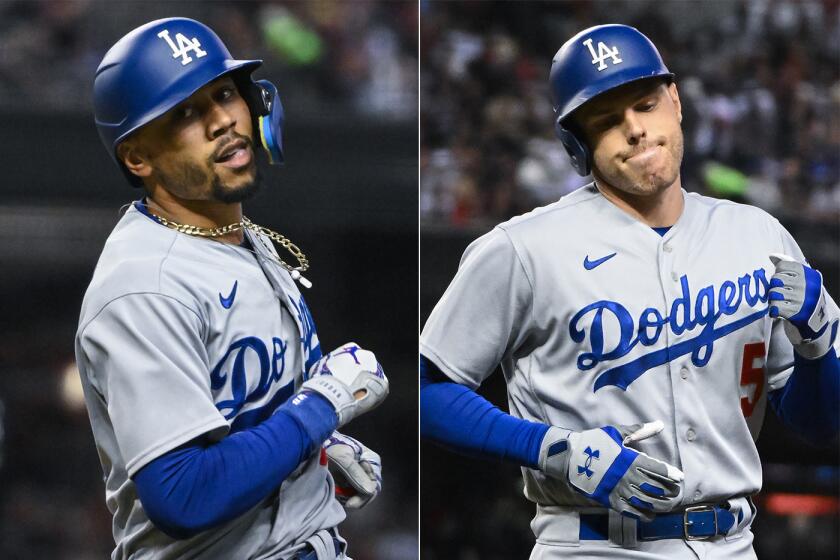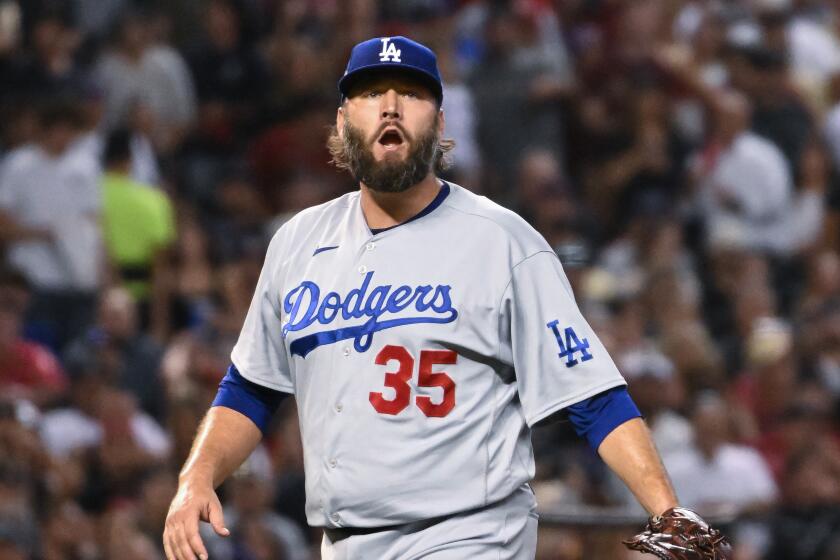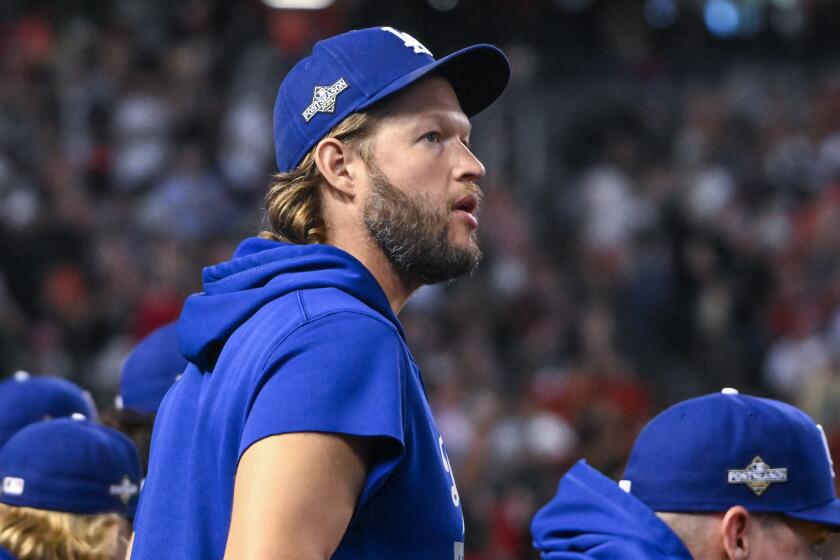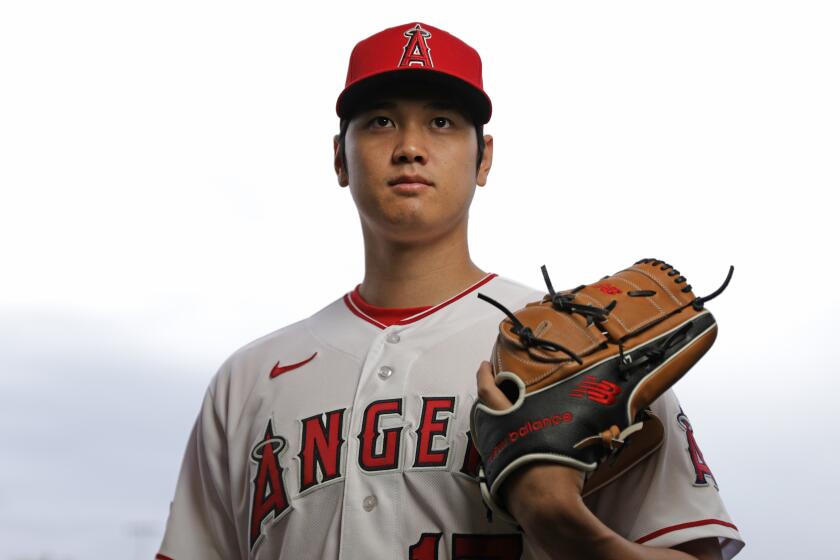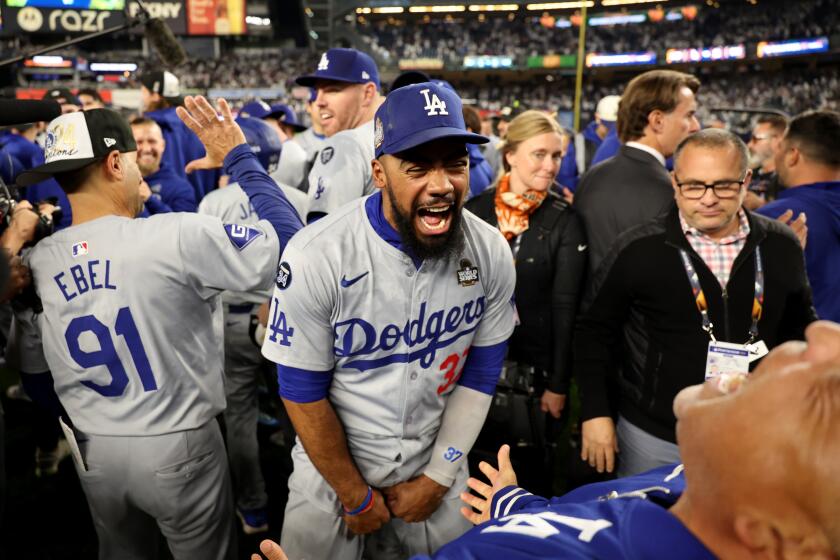Entering a critical offseason, Dodgers seek answers to their postseason dilemma
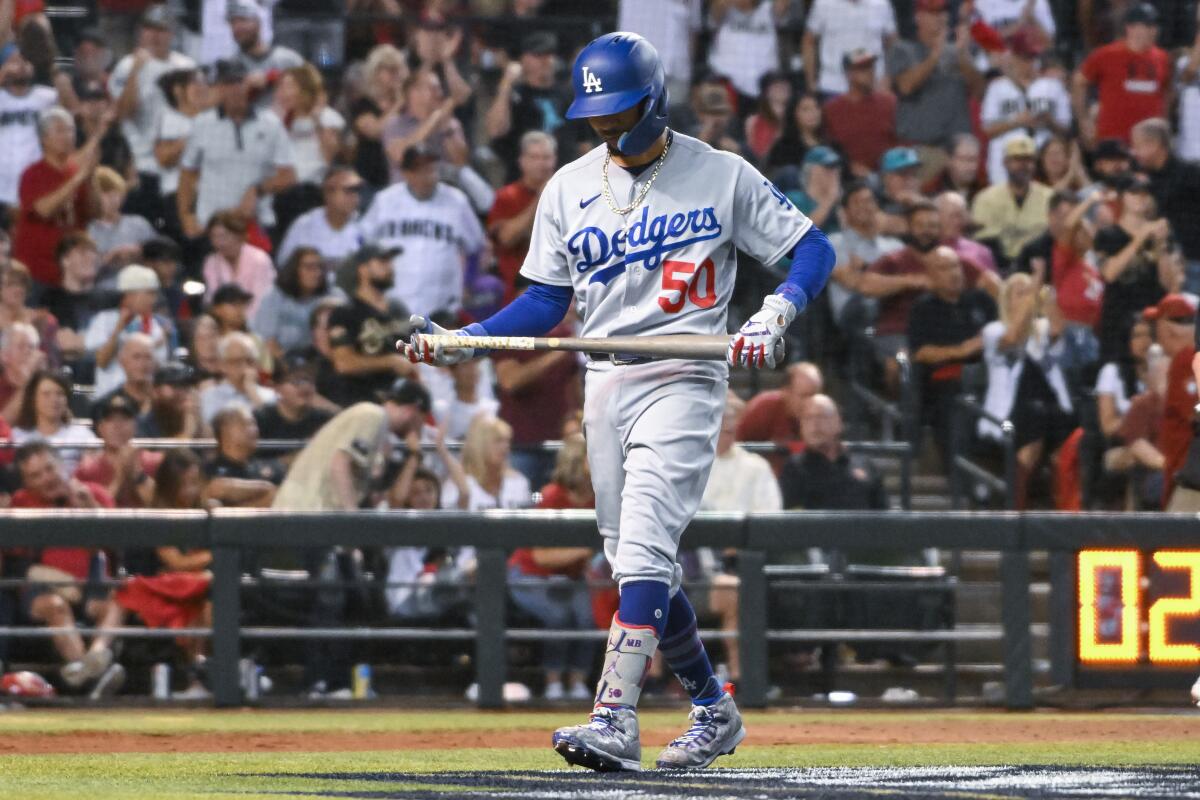
- Share via
PHOENIX — Dodgers manager Dave Roberts contemplated the question and struggled to find the answer.
In the regular season, his team had won 100 games for a third consecutive year, claimed its 10th National League West division title in the last 11 seasons and earned a bye through the first round of the playoffs, maintaining its status as one Major League Baseball’s annual juggernaut clubs.
In this week’s NL Division Series, however, the Dodgers crumbled again, losing three straight games in a sweep against the Arizona Diamondbacks that ended their season in a familiar, frustrating and futile flash.
Thus, in the wake of their elimination Wednesday night, Roberts was asked to diagnose the club’s troublesome October trend, pressed to explain why the Dodgers could be so good for six months in the summer, then disappear when the pressure ratcheted up in the fall.
Their latest playoff failure might be the worst one of them all, a three-game beatdown at the hands of the underdog Arizona Diamondbacks.
“We’ve got great players,” he said, despite the team failing to win a playoff series for the second straight year and coming up short of a World Series title for the 10th time in its 11-year streak of postseason appearances.
“I’ve got to figure out a way to get these guys prepared for whatever format, whatever series,” said Roberts, who has managed eight of those teams. “Yeah, the regular season, I think we do a great job. But the last couple of postseasons it just hasn’t gone well for us. So I’ve got to figure it out.”
He isn’t the only one.
The Dodgers’ roster will receive its fair share of blame for this collapse, from most-valuable-player candidates Mookie Betts and Freddie Freeman (who combined for one hit and three walks in the series) to a makeshift pitching staff that left the club playing from behind all week (the Dodgers’ three starting pitchers gave up 13 runs in 4-1/3 innings).
So too will Roberts, who led the team to a COVID-bubble championship in 2020 but also has overseen October disappointments with talented squads that should have gone much further.
In the aftermath of this latest failure, the Dodgers’ front office, led by president of baseball operations Andrew Friedman, and ownership group, headed by billionaire club chairman Mark Walter, might not escape the ire of the fan base, either.
Mookie Betts and Freddie Freeman are in their prime and they still can’t help the Dodgers win a playoff game. That doesn’t bode well for Andrew Friedman.
Though the team lost several key players this year — most notably, pitchers Dustin May and Tony Gonsolin suffered season-ending injuries before staff ace Julio Urías was placed on administrative leave following a September arrest on suspicion of domestic violence — the organization’s brain trust also failed to adequately bolster the roster, leaving cracks in a foundation that were exposed in the playoffs.
Instead of solidifying their starting rotation with another frontline pitcher, a clear need to most external evaluators before and during the season, the Dodgers took a piecemeal approach.
They opted for lower-cost acquisitions, such as Noah Syndergaard (an offseason signing traded in July amid poor performance) and Lance Lynn (a trade deadline arrival who was the losing pitcher in Wednesday’s elimination game), who failed to deliver.
Their reliance upon a stable of unproven or aging pitchers backfired as well. Longtime ace Clayton Kershaw, who will be a free agent this offseason and will consider retiring at age 35, imploded in a Game 1 defeat after pitching through a shoulder injury during the season’s final two months. Promising rookie starter Bobby Miller suffered the loss in Game 2, stumbling in his first taste of playoff baseball.
Rather than pursuing another impact hitter to balance their lineup, the Dodgers settled for a collection of unheralded offensive reinforcements.
Some of the moves proved successful, such as the signings of designated hitter J.D. Martinez and outfielder Jason Heyward. But the bats provided little production when it mattered most, dashing any hopes of a deep October run.
Yes, the Dodgers still are one of the sport’s biggest spenders, boasting a $267-million payroll that will result in them paying luxury-tax penalties for a third consecutive year, despite their best efforts to save money last winter.
Plenty of reasons explain why the Dodgers lost to the Diamondbacks in the NLDS. Having five days off because of the playoff format isn’t one of them.
And yes, they continue to produce an unprecedented level of regular-season dominance, becoming the first team in baseball history to win 100 or more games in four consecutive full-length seasons.
Yet with the Dodgers owning a 3-10 record in their last 13 playoff games dating to 2021, their October problems continue to persist too — serving as the backdrop to what will be another critical offseason.
“We’re going to kind of regroup,” Roberts said. “It’s a tough feeling and we’ve got to find a way to get back up and not feel sorry for ourselves and get better. That’s just the only option.”
It’s doubtful that process will include major personnel changes.
Roberts, who aptly handled a bullpen that yielded one run over 122/3 innings in Games 2 and 3, will be entering the second season of the three-year contract extension he signed last year.
Pitching coaches Mark Prior and Connor McGuiness remain lauded despite the team’s dip in performance on the mound.
The hitting staff already got a shake-up last year, when Aaron Bates was promoted to replace Brant Brown. So did the bench coach position, which was shifted from Bob Geren to Danny Lehmann.
Following the Dodgers’ season-ending loss, pitcher Clayton Kershaw says he hasn’t decided yet whether he’ll play again next season or if he’ll retire.
The front office also seems likely to remain unchanged, assuming none of Friedman’s top lieutenants — including general manager Brandon Gomes, who has been linked with other job openings in the past — aren’t lured away by rival clubs.
The roster faces more potential turnover, starting with the unknown of Kershaw’s plans.
Even in his 16th season, the three-time Cy Young Award winner was productive this year, going 13-5 with a 2.46 earned-run average. The Dodgers would love to have him back, but Kershaw has other options. His hometown Texas Rangers have tried to sign him the last two offseasons and now are in the American League Championship Series. The Dallas native also could retire, especially if his shoulder injury remains an issue.
“We’ll see,” he said when asked about his future Wednesday. “I’m not sure. I don’t know how to answer that right now.”
The Dodgers have several other notable pending free agents, including Heyward and Martinez. They also have club options for third baseman Max Muncy and reliever Joe Kelly.
Add it all up, and the Dodgers could clear more than $100 million from this year’s payroll. That would give them plenty of flexibility to pursue top talent in in a free-agency class that is headlined by Angels two-way star Shohei Ohtani, likely National League Cy Young Award winner Blake Snell of the San Diego Padres and standout Toronto Blue Jays third baseman Matt Chapman.
Twice the Dodgers were considered the favorites to land Shohei Ohtani. Twice the Dodgers failed. Why will it be different this offseason with the organization’s white whale?
Of course, the Dodgers had the chance to embark on a similar roster makeover last year. But rather than make a big splash, they executed only a string of minor moves that worked in the regular season but failed to correct their postseason dilemma. Perhaps a second straight playoff flop means, in lieu of new faces in the front office and at the helm, the Dodgers could consider a shift in approach instead.
Three years removed from their only title of this generation, the pressure is mounting for them to reach the mountaintop again.
And while postseason baseball can be a crapshoot, as Friedman likes to say, the team is nonetheless in desperate need of answers.
More to Read
Are you a true-blue fan?
Get our Dodgers Dugout newsletter for insights, news and much more.
You may occasionally receive promotional content from the Los Angeles Times.

